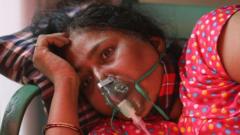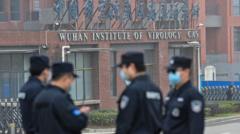More than 370 million individuals globally depend on medical oxygen annually, yet fewer than one in three actually receive it, as cited in a report released by a panel of experts. The dire shortage has severe repercussions on health outcomes, particularly in low- and middle-income countries. The report, featured in The Lancet Global Health, underscores that during the peak of the Covid-19 pandemic, many patients in these regions faced devastating oxygen shortages, often leading to preventable fatalities.
Dr. Hamish Graham, a pediatrician and lead author of the report, highlighted the growing urgency of addressing this gap. "We know that there’s more epidemics coming, and there’ll be another pandemic, probably like Covid, within the next 15 to 20 years," he stated, signaling a pressing need for solutions to bolster oxygen availability.
Recent geopolitical developments, including a freeze on foreign aid by the Trump administration, have further impeded efforts to enhance oxygen access—an oversight the report urges governments and funding bodies to prioritize. To fully address the issue, a total investment of roughly $6.8 billion is indicated as necessary for improving oxygen supplies, a challenging pursuit amidst current economic conditions.
Medical oxygen is critical across a wide spectrum of health conditions, from treating pneumonia and respiratory ailments to supporting major surgeries. Both children and adults may require oxygen for a myriad of severe infections, including malaria and sepsis, making it essential that global efforts focus on expanding access. As the climate continues to change and populations grow, ensuring the availability of this vital medical resource has never been more crucial.





















